The 2017-2018 Arab Opinion Index is the sixth in a series of yearly public opinion surveys across the Arab world conducted by Arab Center for Research and Policy Studies in Doha, Qatar. The first survey was conducted in 2011, with surveys following in 2012-2013, 2014, 2015, and 2016.
The 2017-2018 Arab Opinion Index is based on the findings of face-to-face interviews conducted with 18,830 individual respondents in 11 Arab countries: Egypt, Iraq, Jordan, Kuwait, Lebanon, Mauritania, Morocco, Palestine, Saudi Arabia, Sudan, and Tunisia. Sampling followed a randomized, stratified, multi-stage, self-weighted clustered approach, giving an overall margin of error between +/- 2 % and 3% for the individual country samples. The overall samples guarantee probability proportional to size (PPS), ensuring fairness in the representation of various population segments. With an aggregate sample size of 18,830 respondents, the Arab Opinion Index remains the largest public opinion survey in the Arab world. The fieldwork was carried out by an overall team of 840 individuals, equally balanced by gender, who conducted 45,000 hours of face-to-face interviews. The team covered a total of 700,000 kilometers across the population clusters sampled. The sections below give selected highlights of the findings of the 2017-2018 Arab Opinion Index.
Section 1: Living Conditions of Arab Citizens
- Only 22% of respondents reported that their household income was sufficient for them to save beyond covering necessary expenditures. A further 46% reported that while their household income was sufficient to cover necessary expenditures, it was not enough to sustain savings. These families are designated as those living “in hardship.” Further, fully 30% of citizens in the Arab region live “in need,” in that their household incomes do not cover their necessary expenditures. When compared to the baseline year of 2011, the number of households considered “in need” has decreased by 11%, which is a significant difference.
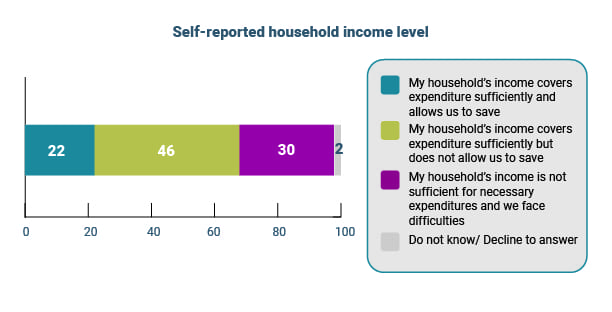
- 64% of respondents evaluate the level of safety/security in their home countries positively, while 35% view it negatively. 39% of respondents evaluate their home countries’ economic situations positively, compared to 59% who have an overall negative view. This measure has remained stable across successive polls of the Arab Opinion Index. By comparison, 39% view their home countries’ political situations positively, while 55% have a negative view.
- When asked to identify the most pressing problems for their countries to tackle, 33% of respondents provided answers that focused on economic issues: unemployment, poverty, and inflation. A further 10% offered answers that centered on safety, security, and stability while 22% gave answers concerning political issues, such as governance, democratic transition, insufficient public services, and financial and administrative corruption.
- 26% of Arabs want to immigrate to other countries. While a desire for economic improvement was the most cited incentive to leave one’s country, approximately one-fifth of would-be emigrants cited political reasons and concerns over safety and security. This was highly dependent on the subjective circumstances in the country surveyed; half of Iraqis and over a quarter of Palestinians cited security and political concerns as their reasons to leave their home countries.
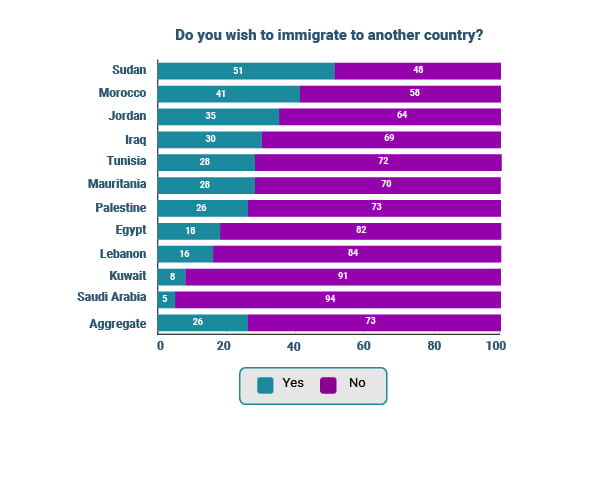
Section 2: Perceptions of State Institutions and Governmental Effectiveness
- Results from the 2017-2018 Arab Opinion Index reflect a generally low level of public confidence in Arab governments and civilian government institutions. People showed the least confidence in political parties. In contrast, the Arab public generally has a high level of confidence in their militaries as well as in police/general security.
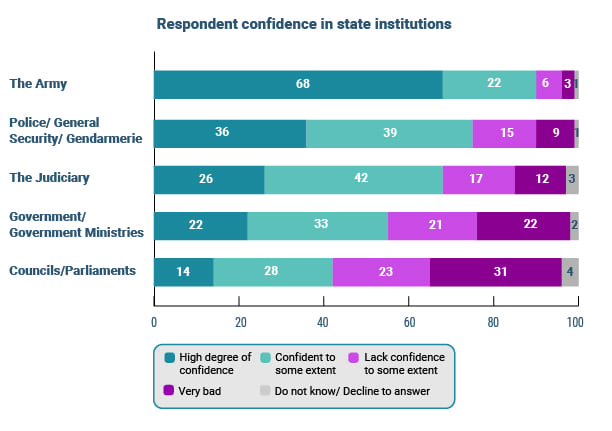
- In general, Arab public opinion regarding confidence in government institutions is polarized: 55% of the Arab respondents indicate a negative view of their governments, while 43% have a positive view. It is important to note that there is wide variation on this issue by country.
- There is a clear consensus among the Arab public that corruption is widespread across their countries: 76% believe that corruption is widespread in their home countries.
- Only 28% of the Arab public believes that the rule of law is applied universally and without prejudice in their home countries, while 52% maintain that the rule of law is applied in their home states but that some groups are shown favorable treatment, and 18% expressed the opinion that the rule of law is not applied in their home countries at all.
- Further, 38% of the Arab public believes that the principle of a fair trial is not prevalent in their home countries.

Section 3: The Arab Public’s Attitudes toward Democracy
- Of the overall group of respondents, an average of 33% defined democracy as safeguarding citizens’ political and civil liberties; 21% as the guarantee of equality and justice for citizens; 14% affirmed the peaceful transition of power and institutional checks and balances; 9% saw it as the protection of safety or security; and 5% cited the improvement of economic conditions.

- A full 76% of Arabs believe that democracy is the most appropriate system of governance for their home countries; this is when they were asked to compare democracy to other systems (such as authoritarian regimes, representative democracies where electoral competition is limited to either Islamist or non-Islamist/secular political parties, or theocracies). Additionally, a majority of Arabs surveyed disagrees with a set of widespread statements that are often employed in public discourse to discredit democracy (e.g., “Democracy is incompatible with Islam”).

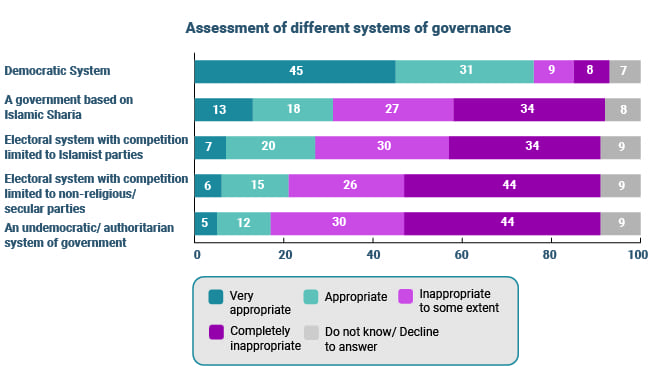
- A majority of Arab citizens, or 57%, said they would accept an electoral victory that resulted in a rise to power of a political party with which they disagreed, while 35% stated that they would be opposed to the ascendancy of a political party with which they disagreed.
- When asked if citizens in their home countries were free to criticize their government without fear of retribution, 37% of the Arab public said this was impossible to do. Indeed, in some countries, such as Palestine and Sudan, majorities expressed the view that they were not free to openly criticize their own governments without fear (59% and 68%, respectively).
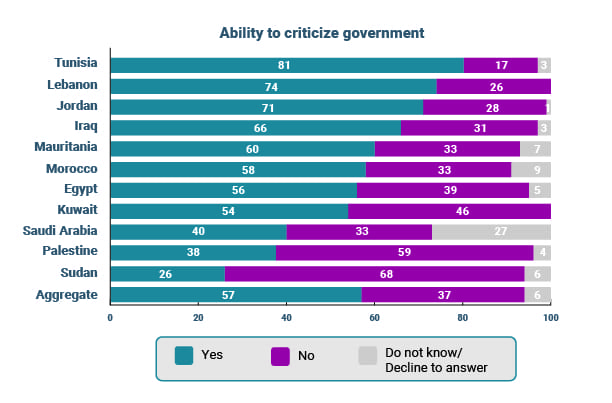
- In assessing the views of citizens on the 2011 Arab uprisings at the moment of their occurrence, results showed that 49% still consider the uprisings to have been positive, and 39% consider them to have been negative.
- The Arab public is divided in terms of its outlook toward the future path of the Arab Spring. 45% maintain that the revolutions will ultimately achieve their aims. In contrast, 34% of Arabs believe that the Arab Spring has been aborted before the revolutions could achieve their aims, and that the former regimes have returned to power. This is a marked decline from 2014, when two-thirds of the Arab public was openly optimistic about the Arab Spring eventually achieving its aims.
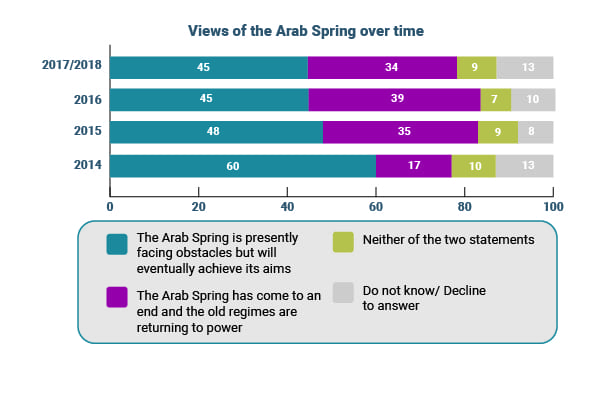
Section 4: Civic and Political Participation
- Despite the fact that citizens in the Arab world support democracy, their political and civic participation is limited. The results show a trend toward increased political apathy: at present, 31% self-identify as concerned about politics while 69% self-identify as politically apathetic. Simultaneously, the percentage of those who said they do not want to participate in elections has risen to 46%, up from 27% in the surveys of 2011 to 2013.
- Although Arab public opinion supports democracy and gauges the level of democracy in Arab countries negatively, it is clear that political apathy increasingly has become the norm. This is perhaps to be expected if we consider that the average citizen does not have space to criticize the government. Egypt is a prime example of this dynamic where the percentage of Egyptians unconcerned with politics increased in the aftermath of the Arab Spring from 48% in 2012/2013 to 70% in 2017/2018.
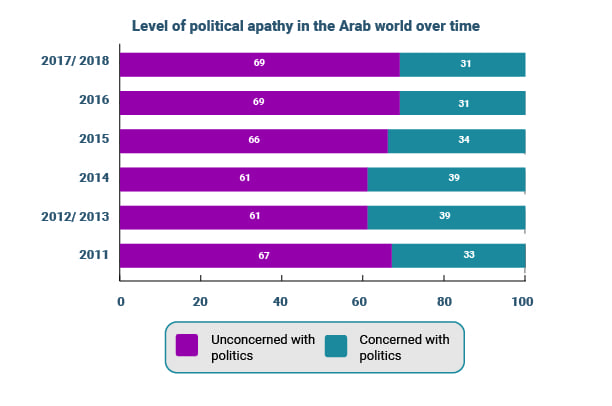
- Membership and participation in civil and voluntary organizations remain extremely limited across the Arab region, with no more than 16% of respondents reporting that they are members of such groups in any given country. When taking into account the level of active participation in the activities of such groups, the level of effective participation would likely diminish further still.
- Additionally, only 12% of Arabs report being members in a political party, 21% are non-members who feel their views are represented by existing groups, while 52% have no affiliation with a political party in any way nor do they feel that their views are represented by any existing political group or bloc. A mere 4% reported not being members but indicated their intention to join soon, while 11% did not know or declined to answer. Respondents who reported that they were either members of political parties, or that there was a political party which they felt represented their views, were concentrated in Mauritania, Morocco, Tunisia, Palestine, Iraq, and Lebanon.
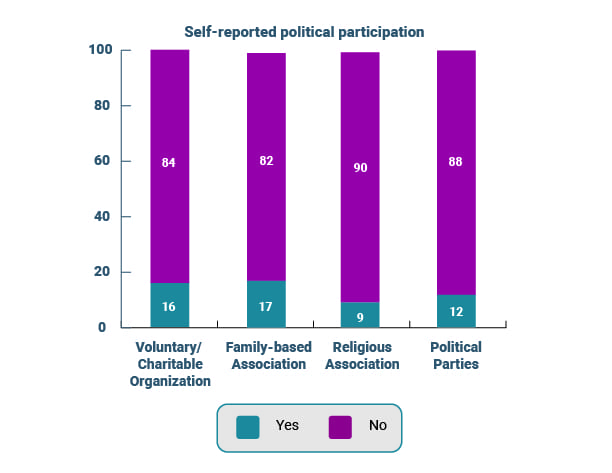
- When it comes to following political news, 37% of Arabs follow the news on the internet (including social media sites belonging to satellite channels). There were some noteworthy correlations: respondents from countries that have high rates of political apathy and no room for criticism are the ones who follow political news the least (e.g., those living in Saudi Arabia and Egypt); in contrast, people living in countries with more open political systems are more concerned with following political news.
- While 68% of respondents reported using the internet, to varying extents, fully 31% indicated that they never use the internet. The results from the 2017-2018 poll show a continuing, statistically significant increase in internet penetration in the Arab region—a steady and upward trend since 2012. The vast majority of Arabs who use the internet also have accounts on Facebook, at 82%, while 26% have accounts on Twitter. The most used language while browsing the internet was, predictably, Arabic, with English the second language most used.
- With regard to news sources, the majority of Arabs (57%) use satellite television, whereas 22% use online platforms as their primary source of news.
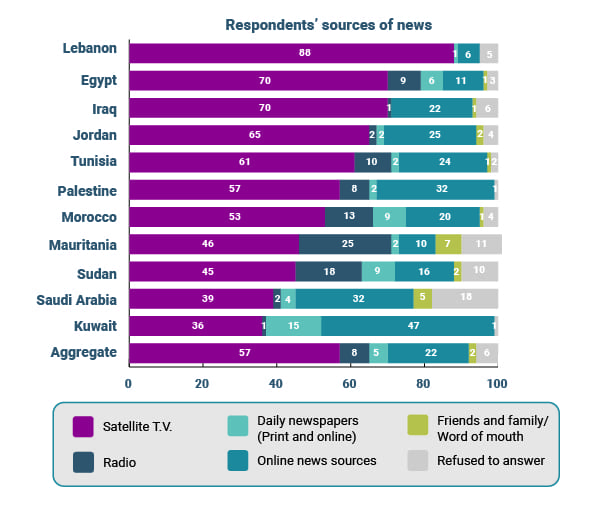
Section 5: Religion and Religiosity in the Public Sphere and Political Life
- Based on self-reporting, a majority of the Arab public is “Religious to some extent” (65%). This compares with 12% of the Arab public who define themselves as “Not religious” and 21% as “Very religious.”
- When asked to define the attributes that define religiosity, most respondents provided answers that focused on an individual’s morality and values (58%) rather than the observance of religious practices (38%). This value has not changed significantly since 2011.

- Of the 65% of Arabs that describe themselves as religious, the majority (68%) opposes edicts that pass negative judgment against members of other religions. Most respondents show no preference on the basis of religiosity, between religious and non-religious individuals, when conducting their social, political, and economic/business interactions. The issue has become more polarized, however, since the percentage of people who profess no preference decreased from 70% in 2011 to 61% today.
- Most Arabs (72%) oppose the involvement of clerics in voter choice or in governmental policy. They are opposed to the employment of religion by governments in order to win support for their policies.
- Arab public opinion is split almost in half in attitudes toward the general separation of religion from the state: only a simple majority (52%) supports the principle of separation of religion from political life.
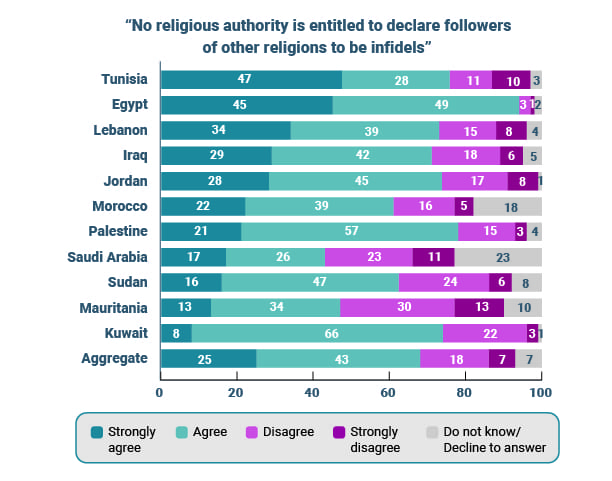
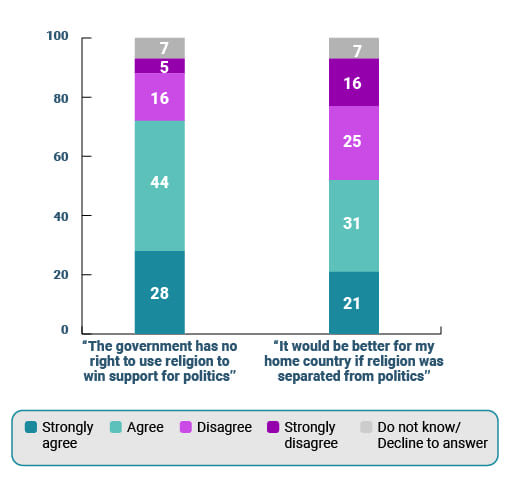
Section 6: Arab Public Opinion and Intra-Arab Relations
- A total of 77% of the respondents to the 2017-2018 Arab Opinion Index supported the sentiment that the various Arab peoples constitute a single nation, in contrast to 19% who agreed with the statement that “the Arab peoples are distinct nations, tied together by only tenuous links.
- Arab public attitudes regarding the foreign policies of regional and global powers toward the Arab region are broadly negative. 79% of respondents held negative views of US foreign policy toward the Arab countries; 64% had negative views of Iran’s Arab policies; and 55% expressed negative views of Russia’s policy toward the Arab states. The 2017-2018 results were the most negative Arab public attitudes toward US foreign policy since 2014 when the question was first included in the survey.
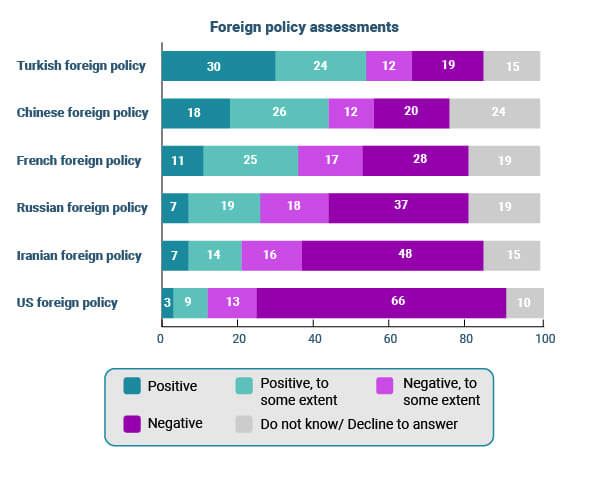
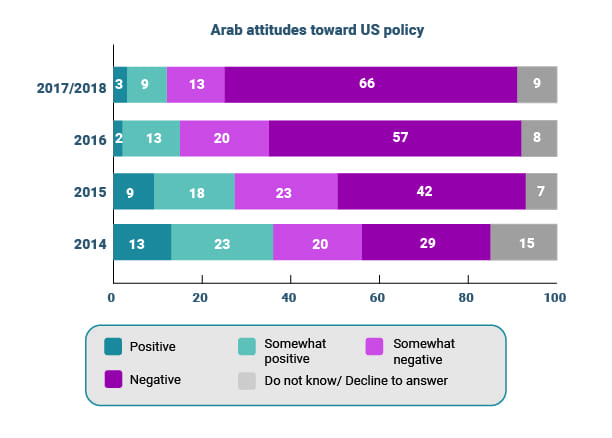
- When asked to look at specific US foreign policy areas, vast majorities of Arabs had negative views of US policy toward Palestine (87%, up from 79% in 2016), Syria (81%), and Iraq (82%).
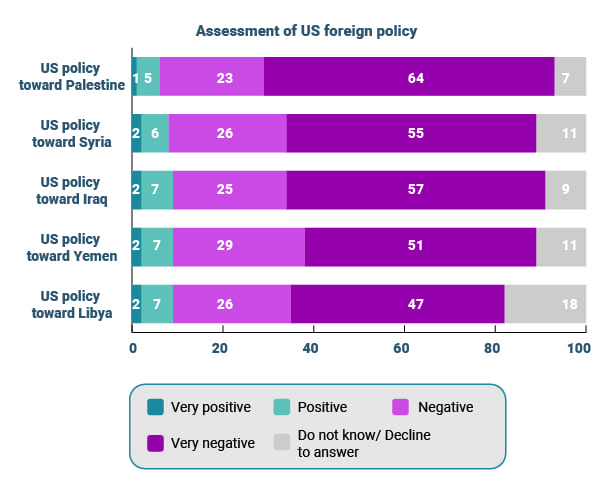
- Respondents in the Arab region provided different answers when asked to name the country that poses the largest threat to their national security. Israel was the most cited, while second was the United States, and third was Iran. Fully 90% of Arabs believe that Israel poses a threat to the security and stability of the region.
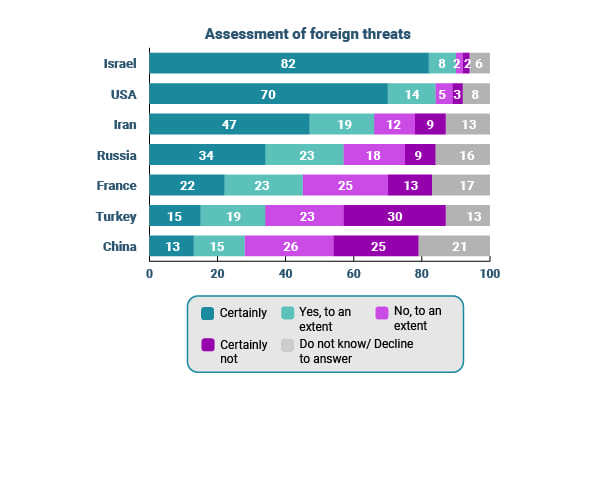
- Over three-quarters of the population of the Arab world agrees that the Palestinian cause concerns all Arabs, and not the Palestinians alone.
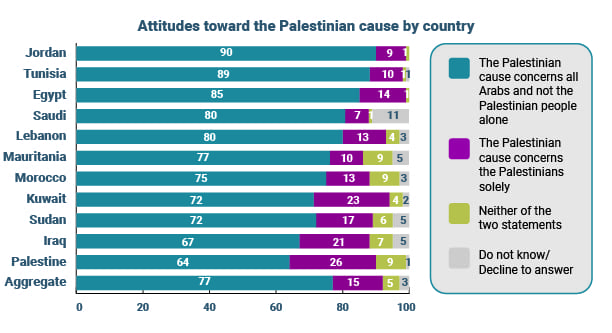
*Note: Because of rounding, not all totals add up to exactly 100%.
- An overwhelming majority (87%) of Arabs would disapprove of recognition of Israel by their home countries, with only 8% accepting formal diplomatic recognition. When asked to elaborate on the reasons for their positions, respondents who were opposed to diplomatic ties between their countries and Israel cited Israel’s colonial and expansionist policies as well as its racism toward the Palestinians. In addition, one-half of those who accepted recognition of Israel by their governments made such recognition conditional on the establishment of an independent Palestinian state.


Section 7: Arab Public Opinion toward ISIL
Almost all respondents (98%) indicated that they were aware of the Islamic State of Iraq and the Levant (ISIL, also known as the “Islamic State of Iraq and Syria” and “the Islamic State”). An overwhelming majority (92%) of the Arab public has a negative view of ISIL, with 2% expressing a “positive” view, and 3% “positive to some extent.”
- Crucially, in the minuscule group of favorable views of ISIL, answers were not correlated with religion: respondents who identified themselves as “Not religious” were just as likely to have favorable views of ISIL as those who identified as “Very religious.” Similarly, no relationship could be shown between respondents’ opinions of ISIL and their views on the role of religion in the public sphere. In other words, public attitudes toward ISIL are defined by present-day political considerations and not motivated by religion.
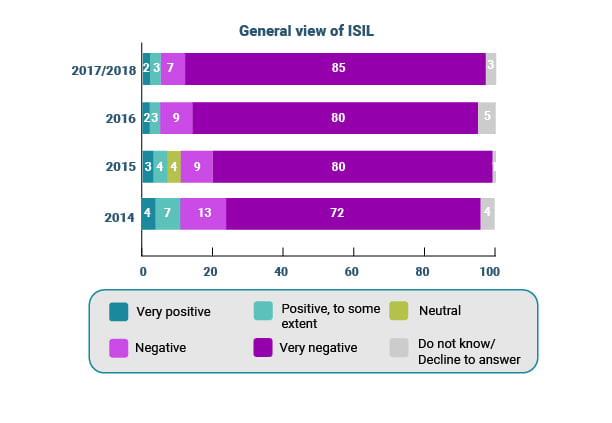
- To explore Arab public opinion about factors contributing to the emergence of ISIL, the Arab Opinion Index 2017/2018 included several new questions. When asked to explain the reasons for ISIL’s popularity among its support base, 13% of respondents stated that this was due to its “military accomplishments;” 16% attributed ISIL’s popularity to its claimed adherence to Islamic principles; 11% to the group’s willingness to confront the West; and 10% to the group’s ability to defend the Sunni Muslim community. When asked to conjecture which factors might drive citizens of Arab countries to join ISIL, 42% said political instability in their home countries, 24% economic conditions, and 6% social circumstances such as inequality, marginalization, and social exclusion. A further 18% credited “brainwashing” and “propaganda,” while a final 6% described the chance to fight foreign powers and/or sectarian militias in Syria and Iraq as the motive for young Arabs to fight with ISIL.
- When asked if the existence of ISIL was the result of internal factors endemic to the region or the result of foreign activity, 29% of respondents believed that the group’s existence resulted from the internal conflicts extant in the Middle East, compared to 59% who attributed it to the policies of foreign powers. When presented with another two statements regarding the origins of ISIL, 42% of respondents were prepared to attribute the rise of ISIL to the religious extremism inherent in Middle Eastern societies while 38% attributed the rise of ISIL to the policies of Arab regimes.
- The Arab public offers a diverse set of remedies when asked to suggest the best means by which to combat ISIL. The five most common preferences for tackling ISIL and terrorist groups more broadly were military means (18%), ending foreign intervention in Arab countries (17%), resolving the Palestinian conflict (13%), supporting democratic transitions (12%), and solving economic issues (9%).
